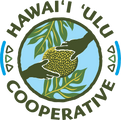ʻUlu Ambassador: Uncle Ricky Rocker
Uncle Ricky Rocker
Born: New Jersey
Lives: Hawaiʻi Island
Career Highlights:
- Living in the wild in Hawaiʻi for 3 ½ years
- Living in Pohnpei for 6 months
- Creating a totally self-sufficient farm in South Kona
First Introduced to ‘ulu: In 1968 (20 years old)
By: Hunger introduced him to ʻulu.
By way of: Aso Manu, a Tongan man who taught him about basket weaving, imu making, ʻulu preparations, fishing techniques, etc., in exchange for teaching him how to speak English. Manu would make an imu every week with about 7-10 ulu and 2-3 chickens. That would be what he would eat (plus fish from spearing) until his next imu.

Uncle Ricky seriously loves ‘ulu, and has been eating it as a significant part of his diet for the past 50 years. His mission is to teach the wonders of breadfruit to the world.
Uncle Ricky loves sharing the abundance of the ʻāina. Ricky has grown, foraged, or bartered for most of his own food his entire adult life, and although he is not a commercial chef, he is a true connoisseur of Polynesian cuisine. “‘Ulu is what literally enabled me to survive without money.” Ricky said.

In the late 1960s, he dropped out of an Ivy League college to embark on a spiritual quest. He moved from his childhood home in New Jersey to San Francisco, the heart of the hippy movement, and then flew to Maui for a three week vacation to celebrate his 21st birthday.
As fate would have it, just before he was about to return home, he was arrested with Joe, his soon-to-be lifelong friend. The charge was 'common nuisance': a misdemeanor defined as "committing an act against common decency and/or common morality.” They were denied all their constitutional rights, and sentenced to 60 days in jail. On the fourth day, the ACLU came to bail them out, and fought their case for two years up to the Hawaiian Supreme Court. During that time, Joe and Uncle Ricky had no money and couldn’t leave Hawai’i.
They decided to stop using US currency altogether and live entirely off the land. Over time, they gave up all their possessions, and disappeared into the wild with only a sarong. They ate only raw fruits that they gathered, and drank water from springs for three and a half years. Two years later, they were joined by Pohai, a free-spirited girl who sold her jewelry to buy them all tickets to Hawaiʻi Island.
When they came out of the fruitarian lifestyle, the first cooked foods they ate were fish they speared and ‘ulu cooked over an open fire or “pulehu” as it is known in Hawaiian.

After four years in Hawai’i, Uncle Ricky yearned to find a place where people still lived in the “real old style.” In 1973, at 25 years old, he stumbled upon Ponape, before it became modernized and renamed Pohnpei.
At the time, foreigners were only allowed to stay on the island for two weeks, but Ricky was adopted by the Nanmarki (vice king) of Madolenihmw (one of the five districts in Ponape), which superseded immigration laws. He lived for six months in the small village of Enibus. There were no stores and very little money, but the area was rich in coconut and ‘ulu trees, or to Uncle Ricky, “the trees of life.”
“They were basically all you needed,” he said.

“‘Ulu is the only carbohydrate that does not have to be planted annually. When a child is born in Ponape, its parents plant seven ʻulu trees and seven coconut trees to begin to sustain the child for its life. Because 'ulu only has to be planted once and grows so easily, over the course of its 50+ year lifespan, it yields more food for less labor than any other crop. It is virtually bulletproof, and so ono.”

He immersed himself in Ponapean culture and developed a deep reverence for indigenous crops and their preparations. Sometimes he would help make marr – fermented ʻulu that was stored in the ground for times of hurricanes or tropical storms or when their other crops failed. However, most of the time he simply enjoyed preparing ʻulu pulehu-style or cooked in coconut milk, his two favorite ways to prepare it. In Ponape, there were only 4 seasonings: salt, chili pepper, lime, and coconut milk. Everything was made with these simple ingredients.
“In Ponape there were three rules when it came to food. The first rule is you never eat alone. The second rule is that you share your food with whomever you are eating with. The third rule is that you never walk past somebody if you have food, without offering them some.” These customs demonstrably ensured a rich life.

As much as Uncle Ricky loved the simple food of the Ponapeans, he loved “these wonderful island peoples vastly more. I basically learned everything I know about life and plants in those six months,” Uncle Ricky said, “and have been eating 'ulu and trying to teach others about its virtues ever since.”

“When I returned home to Moku o Keawe in the 70’s there was basically one variety of ‘ulu – Hawaiian, which is still my favorite today.”

With the help of many friends, Uncle Ricky is producing a documentary series called UKUKU that features his favorite foods: ‘ulu, kalo, uhi, kapioka, and ‘uala.
Check out Episode 1 of Nā Pua Pasifika featuring Uncle Ricky's favorite Hawaiian staple crop, ‘ulu on his new YouTube channel: https://www.youtube.com/@UncleRickyAiPono


Leave a comment
Please note, comments must be approved before they are published